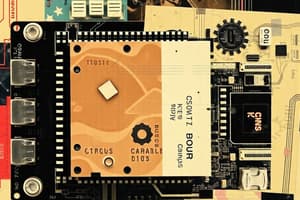Podcast
Questions and Answers
What is an analog computer and where is it used?
What is an analog computer and where is it used?
An analog computer processes continuous data and is used in simulations, like aircraft and weather forecasting.
What are the types of digital computers?
What are the types of digital computers?
Types of digital computers include microcomputers, minicomputers, mainframes, and supercomputers.
Differentiate between analog and digital computers.
Differentiate between analog and digital computers.
Analog computers handle continuous data, while digital computers process discrete data using binary numbers.
What is a mainframe computer and what are its typical applications?
What is a mainframe computer and what are its typical applications?
What is a hybrid computer and how is it used in hospitals?
What is a hybrid computer and how is it used in hospitals?
Which type of computer operates on continuous data?
Which type of computer operates on continuous data?
What are personal computers (PCs) designed for?
What are personal computers (PCs) designed for?
Workstations are designed for personal or casual use.
Workstations are designed for personal or casual use.
Mainframe computers are primarily used by __________ organizations.
Mainframe computers are primarily used by __________ organizations.
What is a characteristic of supercomputers?
What is a characteristic of supercomputers?
What is the main purpose of servers?
What is the main purpose of servers?
Quantum computers are currently widely used in everyday applications.
Quantum computers are currently widely used in everyday applications.
Which type of computer combines features of both analog and digital computers?
Which type of computer combines features of both analog and digital computers?
Embedded computers are typically designed for __________ and reliability.
Embedded computers are typically designed for __________ and reliability.
Flashcards are hidden until you start studying
Study Notes
Analog Computer
- An analog computer processes continuous data, often using physical quantities to represent information.
- Commonly used in simulations, control systems, and specialized calculations, e.g., flight simulators and scientific experiments.
Types of Digital Computers
- Microcomputers: Small, personal computers; widely used in homes and small offices.
- Minicomputers: Mid-range computers, used in manufacturing and laboratories; support multiple users.
- Mainframe computers: Large, powerful systems for bulk data processing; used in large organizations.
- Supercomputers: Extremely fast, capable of processing vast amounts of data; used for complex simulations and research.
Differences Between Analog and Digital Computers
- Analog computers handle continuous data; digital computers handle discrete data and process it in binary form.
- Analog systems are often simpler and faster for certain tasks; digital computers are more versatile and accurate in calculations.
- Digital computers rely on logic gates and algorithms; analog computers often use electrical signals to model physical phenomena.
Mainframe Computer
- A mainframe computer is a powerful, large-scale machine capable of processing vast amounts of data simultaneously.
- Typical applications include financial transaction processing, large-scale data storage, and enterprise resource planning in sectors like banking, insurance, and government.
Applications of Supercomputers
- Supercomputers are used in scientific research, climate modeling, molecular modeling, cryptography, and complex simulations in fields such as aerospace, medicine, and physics.
Hybrid Computer
- A hybrid computer combines features of both analog and digital computers, allowing it to process both continuous and discrete data.
- In hospitals, hybrid computers are used for medical imaging and patient monitoring systems, integrating real-time data with analytical capabilities for diagnostics.
Classification of Computers
- Computers are classified based on processing capabilities, size, application, and technology.
- Processing capability classification includes analog, digital, and hybrid systems.
- Size classification includes microcomputers, minicomputers, mainframes, and supercomputers.
- Application classification involves categories like personal, business, server, and embedded computers.
- Technology classification focuses on hardware types, such as general-purpose and application-specific computers, as well as advancements in quantum and parallel computing.
Types of Computers
- Analog Computers: Utilize continuous data and physical representations, such as voltage levels, making them ideal for scientific simulations and control systems.
- Digital Computers: Operate on discrete binary data; prevalent in modern technology, including desktops, laptops, and servers, and are capable of executing complex calculations.
- Hybrid Computers: Merge analog and digital functionalities, particularly beneficial for specialized equipment like MRI machines, effectively processing both continuous and discrete data.
- Personal Computers (PCs): Built for single-user scenarios, available in diverse formats (desktops, laptops, tablets), widely utilized for home and office tasks.
- Workstations: Feature powerful CPUs, advanced graphic capabilities, and ample memory, specifically designed for high-performance tasks in fields such as engineering and graphic design.
- Servers: Function as resource providers over a network, with categories including file, web, and database servers, emphasizing reliability and continuous availability.
- Mainframe Computers: Large systems serving extensive organizations, enabling simultaneous user access and data management, common in sectors like banking and governmental operations.
- Supercomputers: Exceptionally fast machines intended for intricate calculations, employed in areas like scientific research, weather forecasts, and large-scale simulations, with immense data processing power.
- Embedded Computers: Embedded within devices to execute targeted functions; typically found in everyday items (microwaves, vehicles), designed for efficiency and operational stability.
- Quantum Computers: Use principles of quantum mechanics for advanced calculations, targeting complex problems potentially unsolvable by classical systems; currently in experimental development with applications in cryptography and complex modeling.
Studying That Suits You
Use AI to generate personalized quizzes and flashcards to suit your learning preferences.




